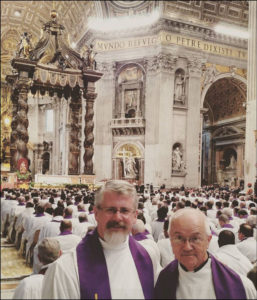Monsignor Humbrecht, Father Reed among those chosen by Pope Francis to preach, teach about God’s mercy
By Catholic News Service

Father Joe Reed, left, and Monsignor Al Humbrecht are shown on Ash Wednesday at the Vatican, where Pope Francis appointed the Diocese of Knoxville priests and some 700 fellow clergy to be envoys of mercy during this Year of Mercy.
More than 1,000 “missionaries of mercy” from all over the world have received a special mandate from Pope Francis to preach and teach about God’s mercy.
About 700 of the missionaries chosen by Pope Francis were in Rome to receive their special mandate in person during an Ash Wednesday ceremony in St. Peter’s Basilica Feb. 10.
For the holy year, which runs until Nov. 20, Pope Francis said he would designate “missionaries of mercy” to be unique signs of God’s mercy. He also is giving them special authority to pardon sins that carry penalties that only the Holy See can lift.
Archbishop Rino Fisichella, president of the Pontifical Council for Promoting New Evangelization, the office organizing events for the Year of Mercy, said there had been a huge response from priests and religious men who – with permission from their bishops or superiors – requested to serve as these special missionaries.
In the Diocese of Knoxville, Monsignor Al Humbrecht, pastor of Holy Spirit Church in Soddy-Daisy, and Father Joe Reed, associate pastor of the Cathedral of the Sacred Heart of Jesus, were selected as the diocese’s missionaries of mercy.
Monsignor Humbrecht said he was overwhelmed by the universality of the mercy missionaries’ role in bringing the message of God’s mercy to the faithful.
“When we gathered on that Tuesday in front of Castel Sant’Angelo to start the procession to the Holy Door, we gathered by language groups. But as I looked around and saw a multiplicity of religious habits and diocesan priests – young, old, black, white, brown – I was struck by the image of the universal Church proclaiming this mission of mercy,” Monsignor Humbrecht said.
He said Pope Francis spoke directly to the missionaries, telling them they need to be like a mother in recognizing, without verbalization, their child’s needs, and assure the faithful of God’s infinite mercy.
“In the Holy Father’s address to us, how he stressed our role in the sacrament of reconciliation, to be that sign of God’s mercy,” Monsignor Humbrecht added.
The original plan was to have just 800 missionaries; however, the number of requests was so great, 1071 men ended up being chosen, Archbishop Fisichella said. The missionaries will serve in their own dioceses, but they may be invited by other bishops to visit other dioceses as well.
The pontifical council is sending out to all the world’s bishops a list of the names and personal contact information of all the missionaries appointed by the pope, the archbishop said.
It will then be up to an individual bishop to reach out to a missionary on the list to invite him to his diocese, as well as cover expenses and provide what may be needed for his stay, the archbishop said.
Missionaries were chosen from all over the world, he said, including China, United Arab Emirates and East Timor. There were to be 125 missionaries from the United States and 10 missionaries from Canada, according to the council.
“It is only the pope who nominates these missionaries, not the bishops, and it is he who entrusts them with the mandate to announce the beauty of the mercy of God while being humble and wise confessors who possess a great capacity to forgive those who approach the confessional,” the archbishop said.
The appointed missionaries were invited to Rome for a special meeting with the pope Feb. 9. They received their papal mandate the next day during a ceremony in St. Peter’s Square in the presence of the relics of Sts. Padre Pio and Leopold Mandic – both Capuchin priests who spent 14 hours or more a day hearing people’s confessions.
It was the first time their relics had been to Rome, Archbishop Fisichella said. The relics were brought to St. Peter’s Basilica by procession Feb. 5 and remained in the central nave in front the Altar of the Confession until Feb. 11.
The pope requested their relics be exposed for veneration in the basilica, according to jubilee organizers, to be a sign for the missionaries of how God welcomes those who seek forgiveness. ■
